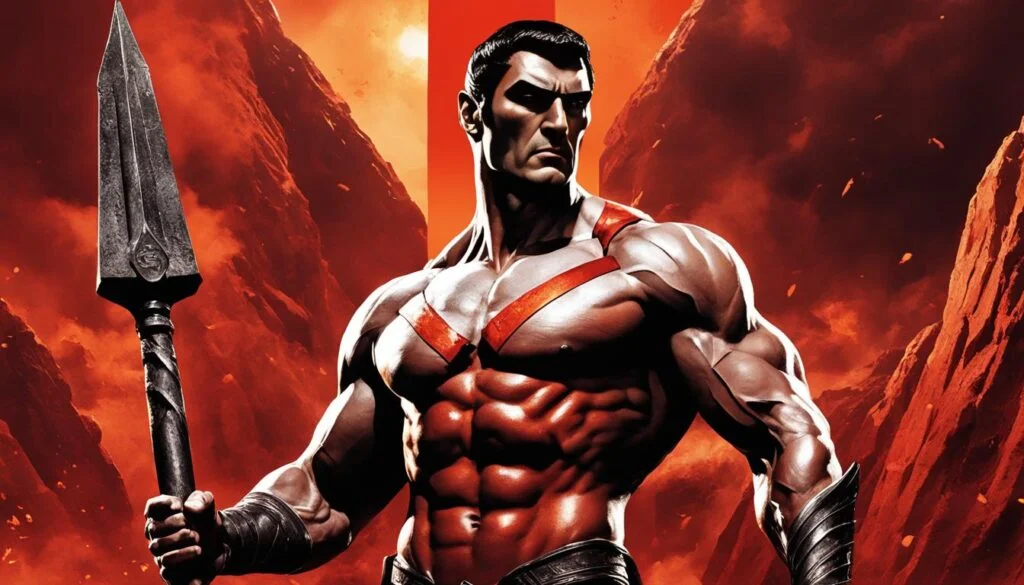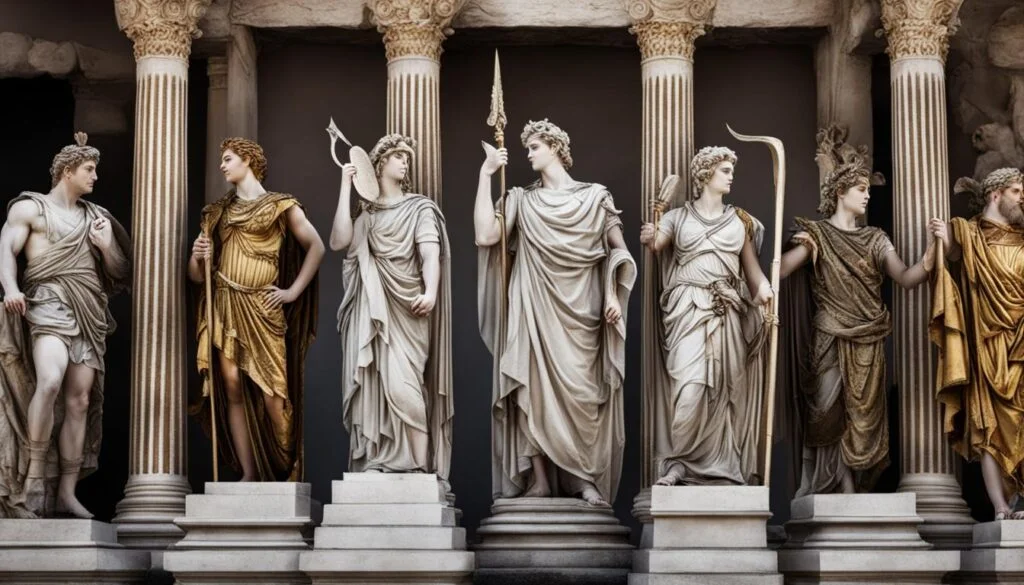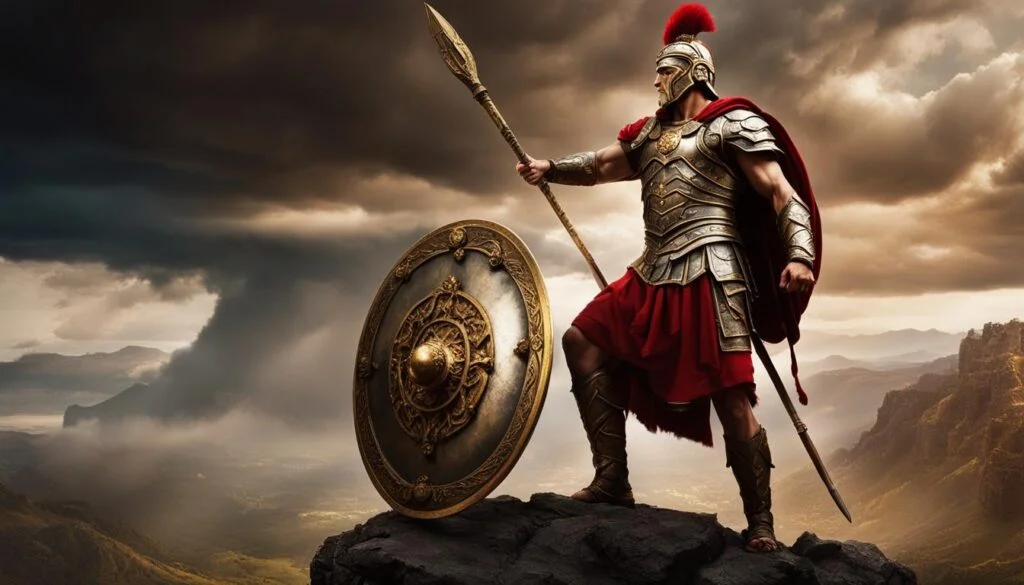Welcome to an exploration of Vulcan, a prominent figure in Roman mythology. Known as Vulcanus or Volcanus, Vulcan is revered as the god of fire, metalworking, and the forge. As a member of the Dii Consentes, the council of twelve major gods in ancient Rome, Vulcan holds a significant place in Roman religion and culture.
Depicted wearing an exomis (tunic) and pilos (conical hat) and carrying a blacksmith’s hammer, Vulcan is the son of Jupiter and Juno. He boasts an impressive lineage, with siblings including Mars, Minerva, Hercules, Bellona, Apollo, Diana, and Bacchus. Vulcan’s Greek counterpart is Hephaestus, the god of fire and smithery, and he is also associated with Sethlans in Etruscan religion.
Vulcan’s oldest shrine, the Vulcanal, can be found in Rome, where worshipers pay homage to the god. Each year, on August 23, the Vulcanalia festival takes place, celebrating Vulcan’s power and influence. This festival involves the lighting of bonfires and sacrificial rituals to honor the god.
Key Takeaways:
- Vulcan is a prominent god in Roman mythology, associated with fire, metalworking, and the forge.
- He is a member of the Dii Consentes, the council of twelve major gods in ancient Rome.
- Vulcan is the son of Jupiter and Juno and has several notable siblings.
- Vulcan is worshiped at the Vulcanal, his oldest shrine in Rome, and his festival, the Vulcanalia, is celebrated on August 23 each year.
- His Greek counterpart is Hephaestus, the god of fire and smithery.
The Origins of Vulcan
The origin of the name Vulcan is uncertain. According to Roman tradition, it might be connected to Latin words associated with lightning and flames. Some scholars, like Walter William Skeat, interpret it as meaning “lustre.” Others have proposed connections to the Cretan god Velchanos or the Ossetic legendary smith Kurd-Alä-Wärgon. A proposed etymology suggests an original Proto-Indo-European smith god named *wl̩kānos. There are also theories linking Vulcan to the Irish name Olcan and the Etruscan god Velchans. The exact etymology of Vulcan’s name remains a topic of debate among scholars.
Vulcan’s Worship and Festivals
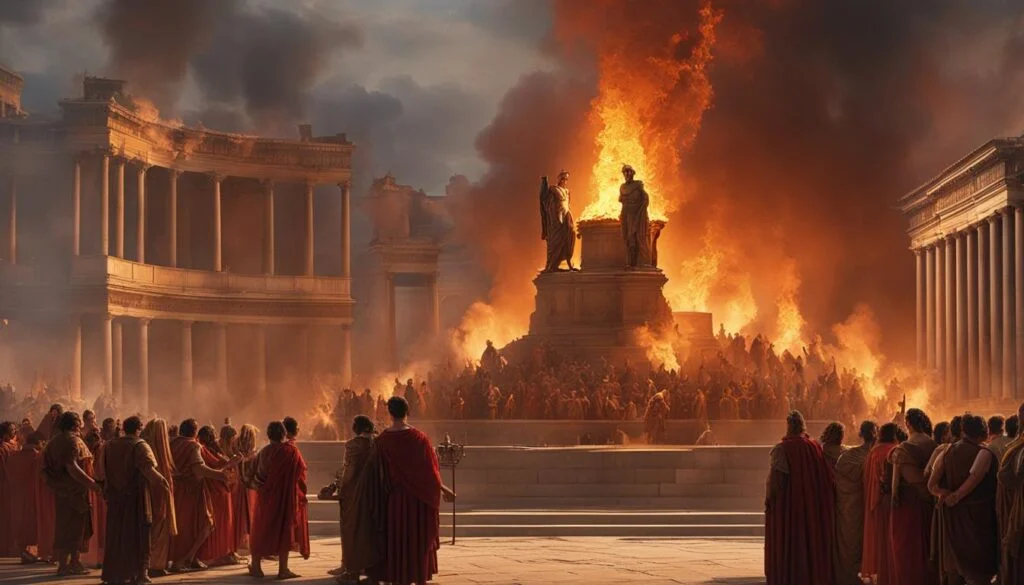
In ancient Rome, Vulcan was honored through dedicated temples and elaborate rituals. The oldest shrine dedicated to Vulcan, known as the Vulcanal, is situated at the foot of the Capitoline Hill in the Forum Romanum. This sacred site dates back to the archaic period of Rome’s kings and serves as a focal point for the worship of Vulcan.
Another significant temple devoted to Vulcan can be found in Campus Martius, a vast public area in Rome known for its various temples and recreational spaces. These temples served as gathering places for followers of Vulcan to engage in religious activities and offer prayers.
One of the most important festivals dedicated to Vulcan is the Vulcanalia, celebrated annually on August 23. During this time, bonfires are lit to honor the god, and offerings of live fish or small animals are made in the fires as sacrifices. The Vulcanalia festival is a vibrant celebration of Vulcan’s influence as the god of fire and forge.
The worship of Vulcan and his associated festivals highlight the reverence and significance the Romans placed on fire and metalworking. The similarities between Vulcan and Hephaestus, the Greek god of fire and smithery, further illustrate the parallel reverence for these deities in Roman and Greek mythology.
Vulcan’s Role in Roman Mythology
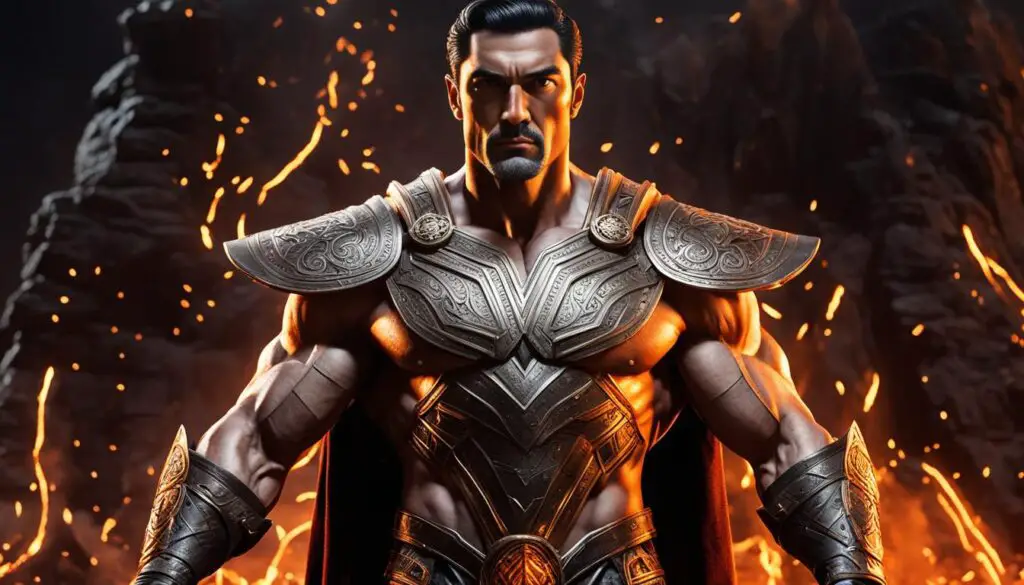
Vulcan, the Roman god of fire, plays a significant role in Roman mythology. As the god of fire, he is associated with both the constructive and destructive aspects of this powerful element. Vulcan’s domains include the fire of volcanoes, deserts, and the fire used for metalworking, showcasing his mastery over flames.
In addition to his association with fire, Vulcan is also known as the blacksmith god. He possesses exceptional skills in metalworking and the forge, shaping raw materials into intricate and useful objects. His expertise in craftsmanship makes him highly revered among the Roman gods.
One of Vulcan’s distinctive attributes is his protective function. Worshippers seek his favor to avert harmful fires and mitigate fire-related dangers. Vulcan’s role as a protector adds an essential dimension to his character and highlights his significance in Roman mythology.
Vulcan’s role extends beyond his association with fire and craftsmanship. He holds a prominent place among the twelve major gods in the Council of the Dii Consentes, making him one of the most ancient and respected gods in Roman religion. His presence in the pantheon reinforces the collective belief in divine powers and their influence on various aspects of human life.
Throughout Roman history, Vulcan’s role as the god of fire, blacksmithing, and protection has left a lasting impact. His significance in Roman mythology is reflected in the worship, festivals, and legends dedicated to him.
Vulcan’s Family and Relationships
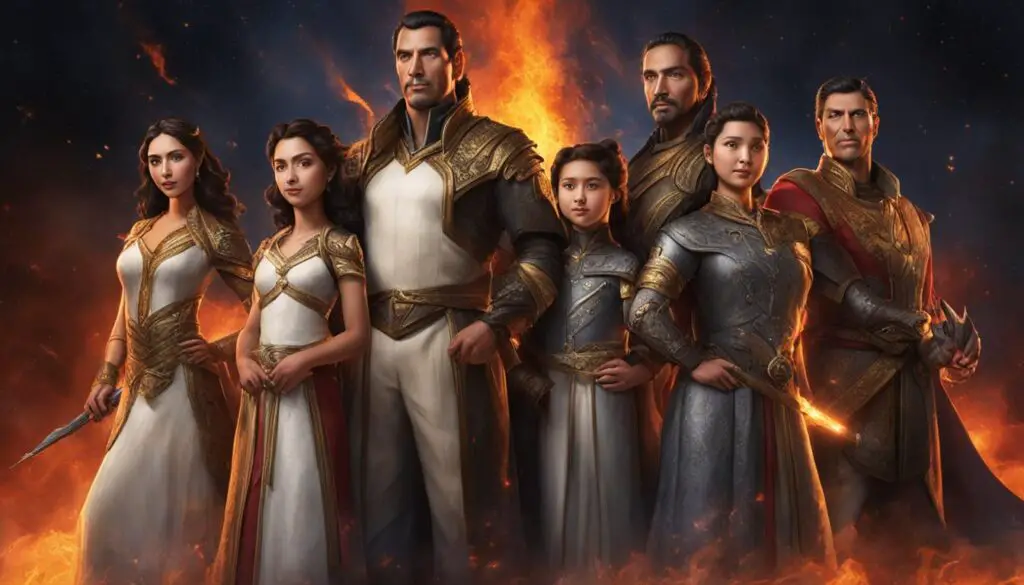
Vulcan, the god of fire and forge in Roman mythology, comes from a prominent lineage. He is the son of Jupiter (also known as Jove), the king of the gods, and his wife Juno. Being born to these two major gods makes Vulcan a divine figure in Roman mythology.
In addition to Jupiter and Juno, Vulcan has several siblings who are also prominent deities. His siblings include Mars, the god of war; Minerva, the goddess of wisdom; Hercules, the heroic figure in Roman mythology; Bellona, the goddess of war; Apollo, the god of music and poetry; Diana, the goddess of the moon and hunting; and Bacchus, the god of wine.
One of the notable relationships associated with Vulcan is his connection with Venus, the goddess of love and beauty. Despite his deformities, Vulcan was married to Venus. However, their marriage ended when Venus left him for Mars, the god of war.
In Greek mythology, Vulcan finds his counterpart in Hephaestus, the god of fire and smithery. Both Vulcan and Hephaestus share similar roles and attributes, highlighting the cultural and religious interconnectedness of Roman and Greek mythology.
These familial connections and relationships add depth and complexity to Vulcan’s character and place within the intricate web of Roman mythology.
Vulcan’s Legends and Myths
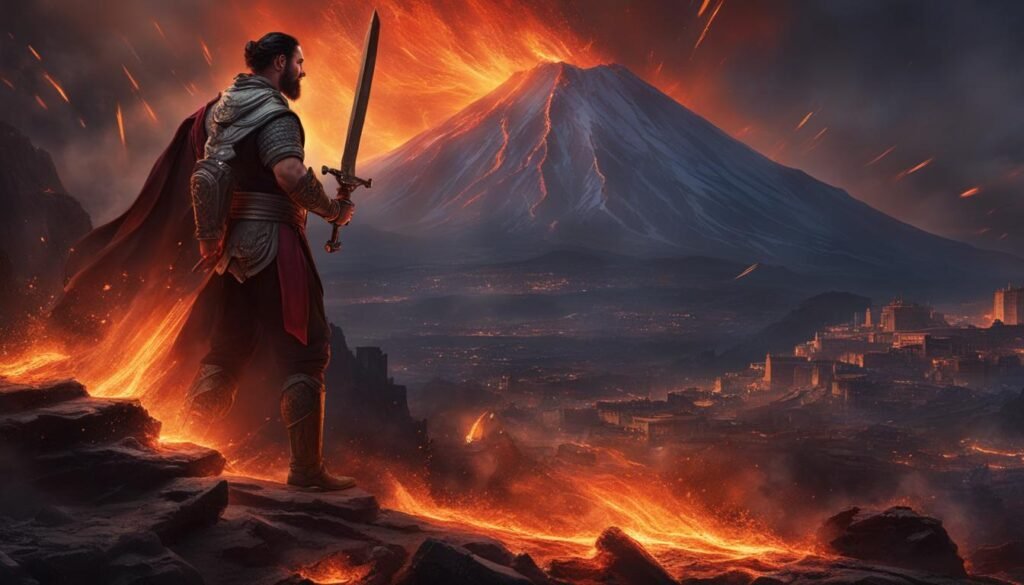
Many myths and legends surround Vulcan in Roman mythology, with some exhibiting parallels in Greek mythology. One renowned myth portrays Vulcan crafting a golden throne for Juno, which ensnares her when she sits on it. This tale showcases Vulcan’s skill as a skilled artisan and the potential treachery of his creations.
Another fascinating myth involving Vulcan is his role in the birth of Minerva, who emerges fully grown and armored from Jupiter’s head. This extraordinary event highlights Vulcan’s connection to the divine and his involvement in pivotal moments in Roman mythology.
Vulcan is also associated with the tumultuous love affair between Venus and Mars. In one particular myth, he cunningly crafts a net to expose their infidelity, revealing their secret rendezvous. This story underscores Vulcan’s intelligence and resourcefulness in navigating complex relationships.
Additionally, Vulcan is the father of several legendary figures, including Cacus, Periphetes, and Cercyon. These mythical beings contribute to the intricate narrative tapestry of Roman mythology, further enhancing Vulcan’s significance.
In Greek mythology, Vulcan’s counterpart is Hephaestus, the god of fire and smithery. The overlap between these two mythologies adds depth and complexity to Vulcan’s character and his role in the pantheon of Roman and Greek gods.
Vulcanalia: The Festival of Vulcan
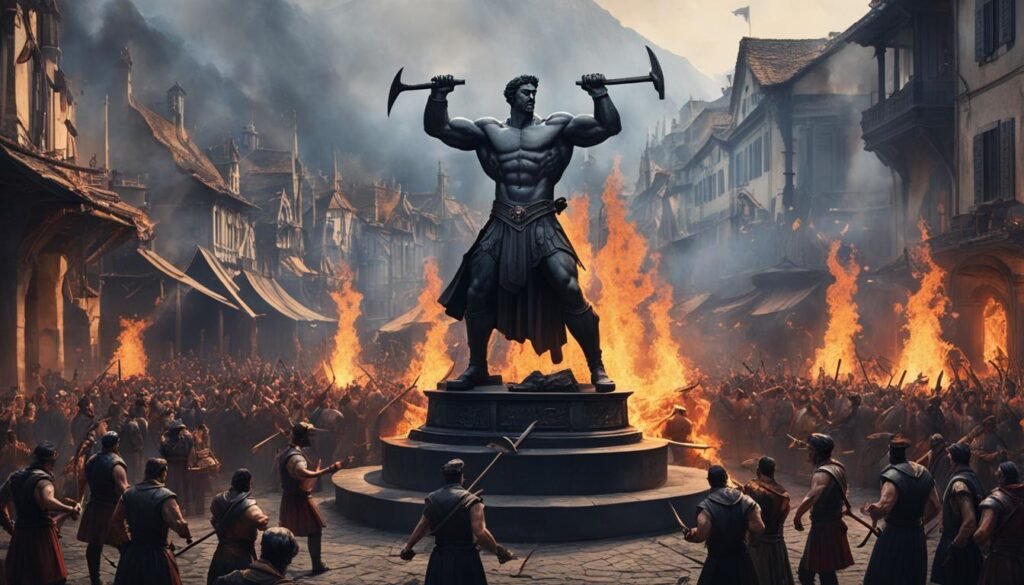
The Vulcanalia is an important festival dedicated to Vulcan, the Roman god of fire and forge. This annual celebration takes place on August 23, coinciding with the peak of summer heat, which brings with it the risk of fire-related dangers to crops and granaries.
During the Vulcanalia, bonfires are lit in honor of Vulcan, symbolizing the transformative power of fire and its importance in metalworking. These bonfires serve as a way to encourage Vulcan’s favor and protection against fire-related dangers.
In addition to the bonfires, rituals are performed during the Vulcanalia to pay homage to the god. As a gesture of respect, live fish or small animals are sacrificed in place of humans, further reinforcing the reverence and worship towards Vulcan.
The Vulcanalia is part of a cycle of festivities in August that are closely tied to agrarian activities and the protection of crops and harvested grain. It provides an opportunity for communities to come together, express their gratitude to Vulcan, and seek his blessings for the safety and abundance of their agricultural endeavors.
Vulcan’s Theology and Symbolism
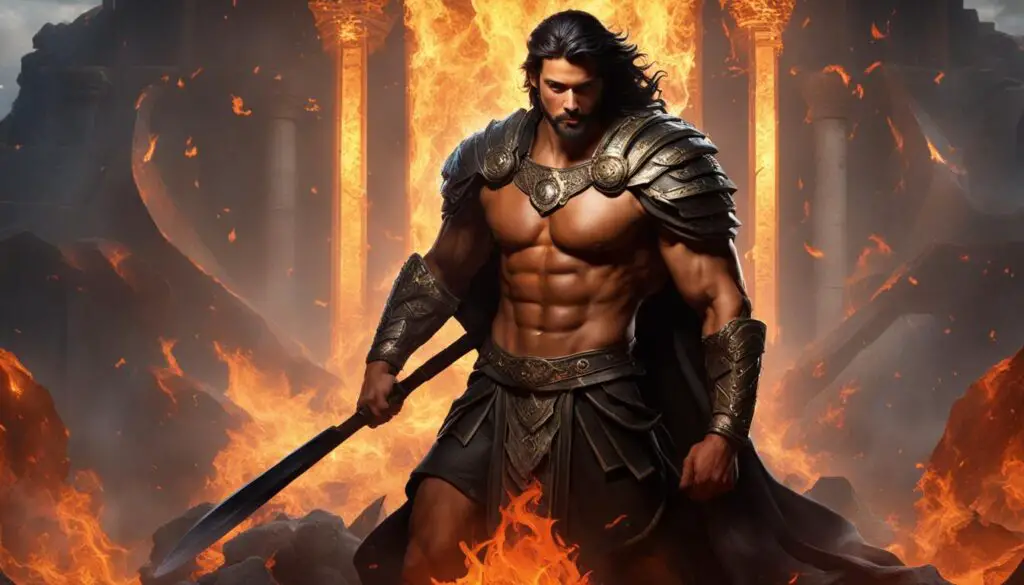
In Roman mythology, Vulcan’s nature is intrinsically tied to fire, embodying both its destructive power and its constructive potential in metalworking. As the god of fire, Vulcan’s symbolism encompasses the dual nature of flames, representing both destruction and fertility.
Within Roman religious ideas, Vulcan takes on a protective role, guarding against harmful forces and averting fires. His temples are often located outside the city, strategically placed to mitigate the risk of fires associated with his domain. Worshippers seek his favor to safeguard against the dangers of fire.
Additionally, Vulcan’s role as a craftsman and blacksmith highlights the creative and transformative power of fire. Through his mastery of the forge, Vulcan shapes metal into useful and beautiful objects, showcasing the potential of fire to create and mold.
Image:
In summary, Vulcan’s theology and symbolism in Roman mythology revolve around his connection to fire, encompassing both its destructive and transformative aspects. As the protective god against fire-related dangers, Vulcan guards against harm while utilizing fire’s creative potential in the blacksmith’s forge.
Vulcan in Ovid’s Metamorphoses and Virgil’s Aeneid
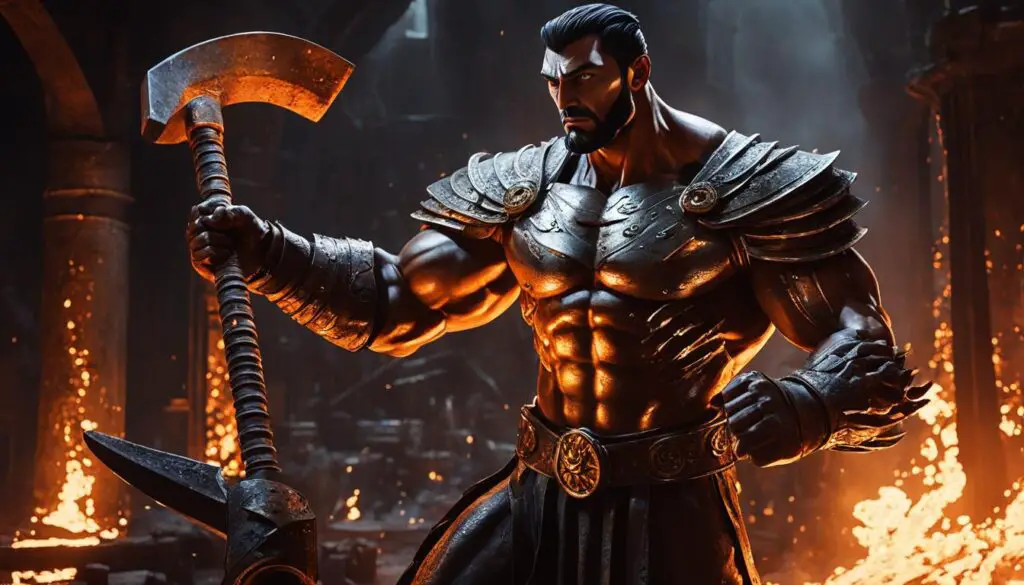
Vulcan, the Roman god of fire and the forge, appears prominently in two significant works of Roman literature: Ovid’s Metamorphoses and Virgil’s Aeneid. These epic poems showcase Vulcan’s role and emphasize his association with fire and metalworking.
In Ovid’s Metamorphoses, Vulcan is involved in the myth of the golden throne. According to the story, Vulcan creates a magnificent throne for Juno, but he includes a secret trap. When Juno sits on the throne, she becomes trapped, unable to stand up without his help. This myth highlights Vulcan’s craftsmanship and his ability to create beautiful, yet treacherous, objects.
In Virgil’s Aeneid, Vulcan plays a significant role in the journey of the Trojan hero Aeneas. Vulcan forges weapons and armor for Aeneas, enabling him to face the challenges and enemies he encounters on his journey to Latium. This showcases Vulcan’s skill as a blacksmith and his important contribution to the epic story.
Through their inclusion of Vulcan, both Ovid and Virgil emphasize the god’s association with fire, metalworking, and craftsmanship. Vulcan’s presence in these Roman epic poems adds depth and narrative richness to the portrayal of Roman mythology, showcasing his importance and multifaceted character.
Conclusion
Vulcan, the god of fire, metalworking, and the forge, holds a significant place in Roman mythology. Revered for his mastery over fire and his exceptional crafting skills, Vulcan embodies the multifaceted nature of Roman gods and goddesses. His protective role against fire-related dangers showcases his importance within the pantheon.
In Roman mythology, Vulcan’s significance lies in his associations with fire and craftsmanship. As the god of fire, Vulcan wields the power to both create and destroy, exemplifying the dual nature of flames. His expertise in metalworking and the forge makes him a patron god for artisans and craftsmen.
The celebrations and festivals dedicated to Vulcan, such as the Vulcanalia, emphasize the veneration bestowed upon him. These rituals serve as a reminder of his protective function and the reverence of his worshippers. Vulcan’s role in Roman mythology adds depth and complexity to the rich tapestry of ancient Roman religion, as he stands among the esteemed gods and goddesses in the pantheon.
FAQ
Who is Vulcan in Roman mythology?
Vulcan, also known as Vulcanus or Volcanus, is a prominent god in Roman mythology. He is associated with fire, metalworking, and the forge.
What is Vulcan’s role in Roman mythology?
Vulcan plays a significant role as the god of fire. He is associated with both the constructive and destructive aspects of fire, including volcanoes and conflagrations. Vulcan is also the blacksmith god, skilled in metalworking and the forge.
Who are Vulcan’s parents and siblings?
Vulcan is the son of Jupiter and Juno. His siblings include Mars, Minerva, Hercules, Bellona, Apollo, Diana, and Bacchus.
What are the origins of Vulcan’s name?
The origin of Vulcan’s name is uncertain. Some scholars propose connections to Latin words associated with lightning and flames, while others suggest a Proto-Indo-European smith god named *wl̩kānos. The exact etymology is still debated.
How is Vulcan worshipped in ancient Rome?
Vulcan is worshipped with dedicated temples and rituals in ancient Rome. His oldest shrine, the Vulcanal, is located at the foot of the Capitoline Hill in the Forum Romanum. Another temple dedicated to Vulcan can be found on the Campus Martius.
Which festival is dedicated to Vulcan?
The Vulcanalia festival is celebrated on August 23 each year in honor of Vulcan. Bonfires are lit to honor the god, and live fish or small animals are sacrificed in the fires.
How is Vulcan depicted in Roman mythology?
Vulcan is often depicted wearing an exomis and pilos and carrying a blacksmith’s hammer. His physical appearance showcases his association with fire and craftsmanship.
What myths and legends are associated with Vulcan?
Vulcan is involved in various myths and legends, including the creation of a golden throne for Juno and the birth of Minerva. He is also associated with the love affair between Venus and Mars.
What is Vulcan’s significance in Roman mythology?
Vulcan is one of the most ancient gods in Roman religion and holds a prominent place among the twelve major gods in the Council of the Dii Consentes. He adds depth and complexity to the pantheon of Roman gods and goddesses.
How does Vulcan compare to the Greek god Hephaestus?
Vulcan and Hephaestus are counterparts in Roman and Greek mythology, respectively. They both share the role of the god of fire and craftsmen, highlighting the similarities between the two ancient civilizations.


